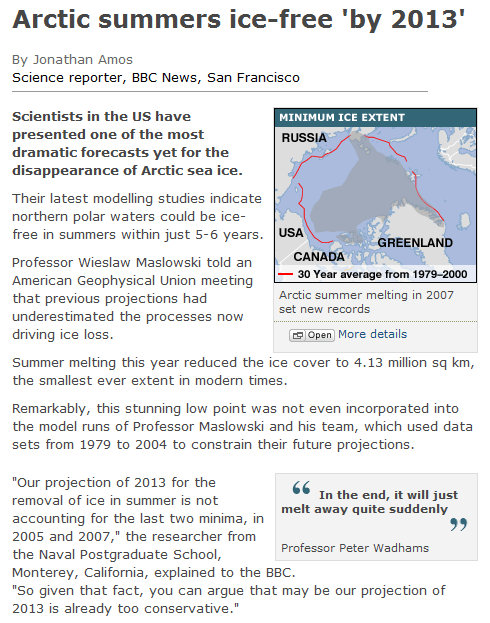“you can argue that may be our projection of 2013 is already too conservative.”
Disrupting the Borg is expensive and time consuming!
Google Search
-
Recent Posts
- Analyzing The Western Water Crisis
- Gaslighting 1924
- “Why Do You Resist?”
- Climate Attribution Model
- Fact Checking NASA
- Fact Checking Grok
- Fact Checking The New York Times
- New Visitech Features
- Ice-Free Arctic By 2014
- Debt-Free US Treasury Forecast
- Analyzing Big City Crime (Part 2)
- Analyzing Big City Crime
- UK Migration Caused By Global Warming
- Climate Attribution In Greece
- “Brown: ’50 days to save world'”
- The Catastrophic Influence of Bovine Methane Emissions on Extraterrestrial Climate Patterns
- Posting On X
- Seventeen Years Of Fun
- The Importance Of Good Tools
- Temperature Shifts At Blue Hill, MA
- CO2²
- Time Of Observation Bias
- Climate Scamming For Profit
- Climate Scamming For Profit
- Back To The Future
Recent Comments
- Bob G on Analyzing The Western Water Crisis
- Mike Peinsipp on Analyzing The Western Water Crisis
- Bob G on Analyzing The Western Water Crisis
- Bob G on Analyzing The Western Water Crisis
- Robertvd on Analyzing The Western Water Crisis
- Bob G on Analyzing The Western Water Crisis
- conrad ziefle on Analyzing The Western Water Crisis
- Bob G on Analyzing The Western Water Crisis
- Bob G on Analyzing The Western Water Crisis
- arn on Analyzing The Western Water Crisis



So accounting for 2005 and 2007, it probably should have been gone by now, since 2013 was being conservative, eh?
So I know that some people are arguing that the ones claiming the sea ice will be gone so soon are on the extreme and don’t represent the mainstream thought. However, if that’s true, where are all the more reasonable scientists opposing these sorts of statements? Why do the most extreme viewpoints get the coverage?
One point though…Dr. Wadhams could end up being right. By his sudden melt statement, things could look really normal until Sept 11, 2013, and then 4 million km^2 of ice just suddenly melts. Best to wait to call him out until Oct 1, 2013. 😉
-Scott
Scott:
Simple answer is $!
“However, if that’s true, where are all the more reasonable scientists opposing these sorts of statements?”
http://hw.libsyn.com/p/b/f/6/bf663fd2376ffeca/2010_Senate_Minority_Report.pdf?sid=960037451704d683012148f664613196&l_sid=27695&l_eid=&l_mid=2336201
Comments start on page 3.
It’s surprising to see a “science reporter” from “BBC News” reporting from “San Francisco” making somewhat, um, “alarmist” statements
He was right.
Prove me wrong.
Andy
Give that the summer minimum has been on an upwards trend since 2007, there might be good reason not to take that forecast seriously.
What’s the error bar on that “trend”? Do you even know how to calculate it? You might just as well say that since it’s been on a downwards trend since 2009, we should take it seriously again. The reality is that any trend based on less than a decade’s data is extremely unlikely to be significant – while the long-term trend is highly significant, and downwards.
An upwards trend is not a downwards trend. Ice free in two years would require an asteroid.